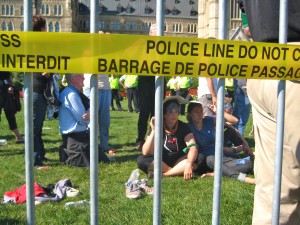OTTAWA (CUP) – An estimated 100 people were arrested on Parliament Hill on September 26 as hundreds of citizens from across the country descended on Canada’s seat of government to protest the construction of the Keystone XL pipeline and further development of Alberta’s oilsands.
Following a morning rally around the Centennial Flame, waves of protesters began to peacefully scale the barricades set up by the RCMP on the parliament lawns and sit on the grass on the other side.

“All together, there were over 30 waves of people that crossed this barricade and did a sit-in on the other side, and now, one by one, these very brave individuals are being arrested and processed by the RCMP,” says York University graduate student and oilsands activist Kimia Ghomeshi.
Ghomeshi says she was at the protest to express solidarity with First Nations communities that are impacted by the tar sand and to oppose the proposed pipeline that would come with the expansion of the tar sands.
The sit-in protest was coordinated by several groups, including the Council of Canadians, Greenpeace Canada, and the Indigenous Environmental Network, and was billed as a publicly organized, peaceful act of civil disobedience that drew citizens from all over the country.
University of Guelph student Cassy Andrew made her way to Ottawa to participate in what she calls “an extremely important action.”
“The bottom line is that resources are being destroyed and depleted, and once that’s done we can’t go back,” says Andrew. “We’re risking the lives of billions of people, depleting a resource such as water, in exchange for oil, when we should be moving away from our dependency on oil.”
Minister of Natural Resources Joe Oliver released a statement on September 26 supporting the Keystone XL pipeline and made no mention of the protest.
The statement said that “Canada’s energy sector is a cornerstone of our national economy and future prosperity… revenues to government from the upstream oil and gas sector in 2010 totaled more than $16 billion.”
It also said that’s “money that supports Canada’s quality of life, including investments in health care, infrastructure, and keeping taxes low for Canadian families. Currently, Canada’s oil sands directly employ 132,000 people and account for hundreds of thousands of indirect jobs across Canada.”
